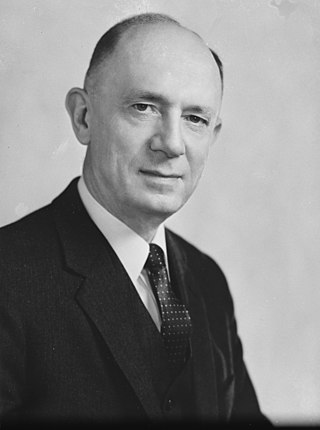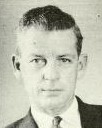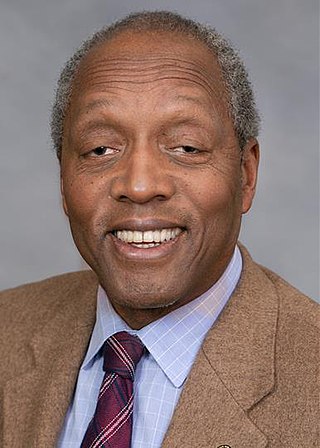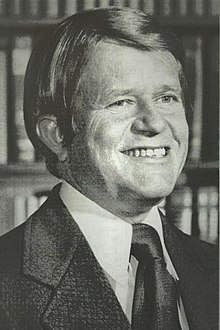
Philip Edward Berger is a Republican member of the North Carolina General Assembly representing the state's thirtieth Senate district, which includes Caswell, Rockingham, Stokes, and Surry counties.

Isaac Beverly Lake Jr. was an American jurist and politician, who served as chief justice of the North Carolina Supreme Court.

The 1986 United States Senate elections were elections for the United States Senate. Held on November 4, in the middle of Ronald Reagan's second presidential term, the 34 seats of Class 3 were contested in regular elections. The Republicans had to defend an unusually large number of freshman Senate incumbents who had been elected on President Ronald Reagan's coattails in 1980. Democrats won a net of eight seats, defeating seven freshman incumbents, picking up two Republican-held open seats, and regaining control of the Senate for the first time since January 1981. This remains the most recent midterm election cycle in which the sitting president's party suffered net losses while still flipping a Senate seat.

Isaac Beverly Lake Sr. (1906–1996), was an American jurist, law professor at Wake Forest University and Campbell University, and politician. He was born in Wake Forest, North Carolina.

The North Carolina Democratic Party (NCDP) is the North Carolina affiliate of the Democratic Party. It is headquartered in the historic Goodwin House, located in Raleigh.

Dennis Alvin Wicker is an American lawyer and politician from Sanford who served as a member of the North Carolina House of Representatives (1981–1993) and as the 31st Lieutenant Governor of North Carolina (1993–2001). As lieutenant governor, he became the first statewide elected official to chair the State Board of Community Colleges, which sets policy for the state's 58-campus system. Wicker was also a member of the North Carolina State Board of Education and the State Board of Economic Development.

The 2008 United States Senate election in North Carolina was held on Tuesday, November 4, 2008. The Senate election coincided with the presidential, U.S. House elections, gubernatorial, Council of State, and statewide judicial elections. Incumbent Republican U.S. Senator Elizabeth Dole ran for re-election to a second term, but was defeated by Kay Hagan.

Harvey Cloyd Philpott was an American businessman and politician who served as the 24th Lieutenant Governor of North Carolina in 1961. Philpott grew up in Lexington, North Carolina. Following the completion of his education, he rose to become president and chairman of the board of the United Furniture Corporation. He held several local political offices before being elected to a seat in the North Carolina House of Representatives in 1953 as a Democrat.
The Young Democrats of North Carolina (YDNC) are the official youth arm of the North Carolina Democratic Party (NCDP). As an auxiliary organization of the NCDP, the President and National Committee-members of the YDNC serve as part of the State Executive Committee of the NCDP.

The 2010 United States Senate election in North Carolina was held on November 2, 2010. The filing deadline for the primaries was February 26; the primaries were held on May 4, with a Democratic primary runoff held on June 22. Incumbent Republican U.S. Senator Richard Burr won re-election to a second term. Burr is the first incumbent to win re-election for this seat since Sam Ervin's last re-election in 1968.

One justice of the North Carolina Supreme Court and five judges of the North Carolina Court of Appeals were elected by North Carolina voters on November 2, 2010, on the same day as the U.S. Senate election, U.S. House elections, and other state-level elections. North Carolina judicial elections are non-partisan. Terms for seats on each court are eight years. All incumbent judges and justices who sought re-election won their respective races, except for Judge Cressie Thigpen of the Court of Appeals, who had been appointed shortly before the election and lost North Carolina's first statewide election to use Instant-runoff voting.

The 1986 United States Senate election in North Carolina was held on November 4, 1986 as part of the nationwide elections to the Senate. Incumbent Republican U.S. Senator Jim Broyhill, who had been appointed in June 1986 to serve out the rest of John Porter East's term, faced off against the popular Democratic former Governor Terry Sanford.

One justice of the seven-member North Carolina Supreme Court and five judges of the 15-member North Carolina Court of Appeals were elected by North Carolina voters on November 8, 2016, concurrently with other state elections. Terms for seats on each court are eight years.

Jay Chaudhuri is an American attorney, professor, politician and a Democratic member of the North Carolina Senate. First appointed to fill a vacancy in April 2016 caused by the resignation of Josh Stein, Chaudhuri was later elected and re-elected, becoming North Carolina's first Indian-American state legislator. In January 2019, he was elected by his colleagues to serve as Senate Minority (Democratic) Whip, the second-highest ranking position in the Democratic caucus.

The 2020 North Carolina lieutenant gubernatorial election took place on November 3, 2020, to elect the Lieutenant Governor of North Carolina, concurrently with the 2020 U.S. presidential election, as well as elections to the United States Senate and elections to the United States House of Representatives and various state and local elections. Primary elections were held on March 3, 2020.

George Wilmarth "Wiley" Nickel III is an American attorney and Democratic politician serving as the U.S. representative for North Carolina's 13th congressional district since 2023.

Malcolm Buie Seawell was an American lawyer and politician. A member of the Democratic Party, he served as North Carolina Attorney General from 1958 to 1960. Seawell was raised in Lee County, North Carolina. After law school, he moved to Lumberton and joined a law firm. From 1942 to 1945 he worked for the U.S. Department of War in Washington, D.C. He then returned to Lumberton and successfully ran for the office of mayor in 1947. He held the post until the following year when he was appointed 9th Solicitorial District Solicitor. While working as solicitor Seawell gained state-wide prominence for his aggressive efforts to prosecute the Ku Klux Klan (KKK), and was credited for ultimately pushing the organization out of Robeson County. Governor Luther H. Hodges later made him a judge before appointing him Attorney General of North Carolina in 1958 to fill a vacancy.

Abraham Penn Jones is a Democratic member of the North Carolina House of Representatives who has represented the 38th district since 2021.

The 2024 North Carolina gubernatorial election was held on November 5, 2024, to elect the governor of North Carolina. Democratic state attorney general Josh Stein won his first term in office, defeating Republican lieutenant governor Mark Robinson. He will succeed Democratic incumbent Roy Cooper, who was term-limited.

The North Carolina Council of State elections of 2024 were held on November 5, 2024, to select the ten officers of the North Carolina Council of State. These elections coincided with the presidential election, elections to the House of Representatives, elections to the North Carolina General Assembly and top state courts. Primary elections took place on March 5, 2024, for offices for which more than one candidate filed per party.













